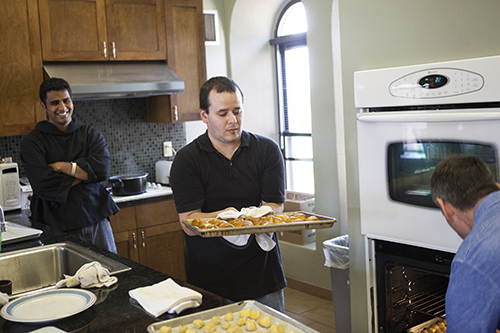Give Up Yourself
Fr. Adrian Burke, OSB
Thursday, March 5, 2020

"Renounce yourself in order to follow Christ."
Rule of St. Benedict 4.10 [Mt 16:24; Lk 9:23]
Lent is more than a season for "giving up" sweets and soft drinks; it is a time for Christians to "take stock" of the whole of our lives. It's a time to prayerfully and, as honestly as we can, examine our lives to see what still needs to change, what needs more conversion, in order for us to more freely love as God loves - loving others without having to first be loved.
The 10th of the 74 “tools for good works” that St. Benedict lists in Chapter 4 of his Rule is the one I quote above. Thomas Merton, one of my favorite contemporary monastic authors, once wrote in his daily journal that perhaps the most important thing for a monk to “give up” is resentment. I would apply this to anyone serious about being a disciple of Jesus.
Resentment is what happens when we harbor anger. It’s easy to lapse into a competitive way of evaluating ourselves over-against others. Competition leads us to resent others when we feel weak or vulnerable as compared to how they seem to us – competition is about comparing.
To make ourselves feel better, we bring others down – sometimes it’s just a matter of thinking poorly about him or her, being judgmental or overly critical of behaviors, for example. Sometimes we act on our thoughts by treating others as less to make ourselves feel better – sinful actions are outward manifestations of what we harbor in our hearts (Mt 15:18-19).
So what we have to “give up” then is ourselves in this sense: letting go of the yoke we “bind” to our own shoulders, a “yoke” that is selfish and rooted in our own insecurities and fear. The “yoke of Christ” is a burden that is light because it is never hefted alone; Christ does the heavy lifting – it is the “burden” of pursuing what one judges better for someone else, including kinder, more wholesome, and more generous thoughts about others.
If you must compete, try to be the first to show respect to the other, supporting with greatest patience one another’s weaknesses of body or behavior. Benedict calls this “the good zeal of monks” (RB 72.5; 7).
When we allow Christ to free us and heal us of our deep wounds, which can cause us to criticize and judge others to feel better about ourselves, we will discover a greater freedom to allow others to be themselves, and to love others as they are without the need to be loved first. This is how God loves; and when we love as God loves, we are truly being who God intends us to be: images and likenesses of God (Gen. 1:26).
Think of self-renunciation as your consent to God’s presence at work in you, empowering you to more freely love as God loves! We must consent daily and allow God to do the heavy lifting and the deep healing we need to be able to love much (see Luke 7:32-50). May this Lent be a blessing for us all!